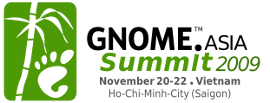The first time I met Bauer Yung, a Computer Science student from Beijing Normal University was at a Beijing Linux User Group meeting a few months ago he was attracted by the concept of Open Source. As the leader of College Open Source Society I encouraged him to start a FOSS Club in his college. We met again at the WiserU workshop and discussed a bit more in details. In a similar manner as what we did when Jesse Zhang (Beihang University) wanted to start his FOSS Club following the GNOME.Asia Summit, I suggested to have a meeting together with FOSS clubs core members from other Beijing Universities.
After some miscommunication about the meeting arrangement we finally ended up with a date conflicting with the Beijing GNOME User Group preventing some members to join. The good thing is that it gave us the first opportunity to share experiences about scheduling, meeting arrangement and locations.
The whole meeting went very well, there were about 10 students from Normal University and about the same numbers from Beihang University and USTB joined, as well as myself and Fred. Bauer wrote a very detailed meeting notes (in Chinese) which can be accessed here.
Basically everybody shared their views and perspectives about:
- What’s the purpose of the FOSS club
- What it takes to start (mailing list, website and regular meeting time / venue)
- What are the tasks of each core members
- How to promote the group
- What are the challenges, problems and their solutions
As a leader of Techgirls Group, I noticed and couldn’t help talking with one of the core members girlfriend, Qingning, English student in Beijing Normal University. She had of course heard a bit about Open Source (through her boyfriend) and even tried Open Solaris which turned out a bit difficult for a beginner so she gave up. She couldn’t understand why people are contributing to Open Source, and even more her boyfriend. Her concerns were mainly around the business model and opportunities as she wouldn’t want him wasting time on something that cannot help them make a living. Hence, Fred and I spent quite some time explaining her the software industry landscape in China where people do not pay for license and all the major online companies IT infrastructures run Linux and Open Source technologies. Finaly she said she’ll give another try and must be using Linux now! I strongly believe Qingning will be a great asset for the newly launched BNU OSS Club, especially for meetings and events organization and building awareness. What’s better than non-geeks like Qingning to talk to people like herself about Linux?
 As part of the organizing members for the first
As part of the organizing members for the first 